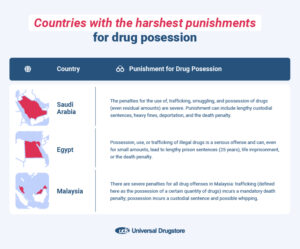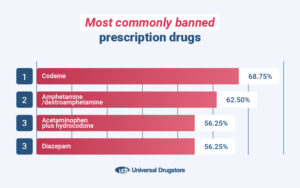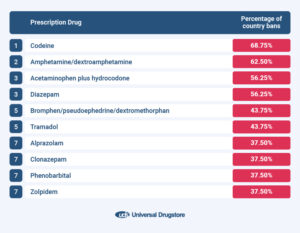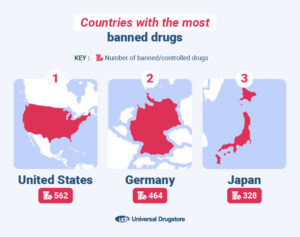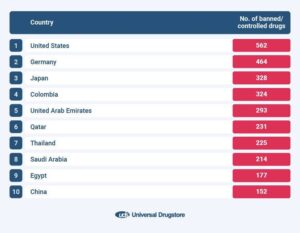Traveling is indeed exciting. However, it’s important to ensure you’re fully informed about the banned prescription drugs and drug control policies in your destination.
The Universal Drugstore analyzed each country’s banned prescription drugs and the legal punishments for carrying them into your host country, revealing the vacation hotspots with the harshest consequences for travelers, which includes the Philippines.
Punishments for Drug Possession
According to the study, the countries most known for having strict drug laws are China, Columbia, Egypt, Germany, India, Japan, Malaysia, the Philippines, Qatar, Saudi Arabia, Singapore, Thailand, Turkey, the United Arab Emirates, the United States, and Vietnam.
In the Philippines, the punishment for drug possession is imprisonment, ranging from six months and one day to four years. A fine of 600 to 4,000 pesos ($10.80 – $72.05) shall also be imposed upon any person possessing or using any regulated drug without the corresponding license or prescription.
Other countries known for the harshest punishments for drug possession are Malaysia, Saudi Arabia, and Egypt, where the possession of even small amounts of unauthorized drugs may result in lengthy prison sentences or, in extreme cases, the death penalty. Meanwhile, the possession of unauthorized drugs in Singapore, Japan, and the United Arab Emirates can lead to hefty fines.
Countries with some of the longest prison sentences include Egypt, where even the possession of small amounts of unauthorized drugs can lead to prison sentences of up to 25 years. Similarly, in India, you could get up to 20 years in prison based on quantity and are liable to a fine of up to 200,000 rupees ($2,399).
What Are the Banned Prescription Drugs?
Stay informed and keep your travels hassle-free by familiarizing yourself with the following commonly banned prescription drugs:
Universal Drugstore reiterated that you always take all appropriate documentation with you, such as a doctor’s note that includes information about your medical condition and the prescribed medication, including details on dosage and any other relevant details. There may also be specific medical forms to fill out before arriving in a different country, so do in-depth research.
As for the countries with the most banned drugs, the United States, Germany, and Japan topped the list.
Celebrities Caught Traveling With Drugs
The study also noted the celebrities caught traveling with drugs. Earlier this year, American model Gigi Hadid was arrested for the importation of marijuana at an airport in Grand Cayman. Due to possession of the drug, the popular social media star was subject to paying a fine of 1,000 Cayman Islands dollars ($1,200) despite being legal to use for medical purposes.
Italian celebrity chef Gino D’Acampo was also detained in a UK airport this year after police sniffer dogs found cannabis in his luggage. Similarly, authorities stopped Love Island star Kaz Crossley at an airport in the United Arab Emirates after a video of her using drugs in Dubai resurfaced three years later.
Meanwhile, Great British Bake Off icon Mary Berry confessed that she was arrested by US customs officers on suspicion of drug smuggling while traveling. In a comical twist, she carried small bags of flour and sugar that were mistaken for cocaine.
Jamie Winn PharmD, Medical Director at Universal Drugstore shared valuable insights on how to navigate traveling with prescribed medications:
“Traveling with prescription drugs demands a good level of research on the legal drug laws in your host country, and you must understand the medication regulations of your destination. Though they may be legal in your country, some medications may have strict rules elsewhere.
If your prescription includes controlled substances, be extra cautious. Always carry a copy of your prescription, clearly stating your medical condition and the necessity of the prescription drugs. Familiarize yourself with the generic names of your medication too, as brand names can vary globally. Ensure that you stay informed as regulations change; therefore, you must check for updates on reliable government sources.
Prepare for the unexpected when traveling with prescriptions. Pack extra medication to account for any delays or unforeseen circumstances, but stay aware of the limits in each country. For example, some countries only allow a month’s worth of medication. Consider carrying a basic first aid kit with essential over-the-counter medications that might be hard to find in your holiday destination.
Finally, you may want to consult your healthcare provider before going on your trip. If you are aware that you will need to carry a banned medication while traveling, they can guide you through the process and anticipate any adjustments, allowing for a much smoother, stress-free travel experience.”
You can view the full study here.

